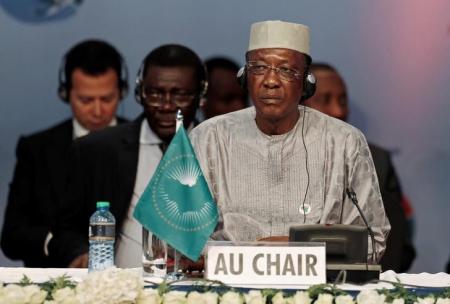
By Gerauds Wilfried Obangome
LIBREVILLE (Reuters) – The African Union said on Tuesday it would send a delegation to Gabon to help resolve a post-election standoff between President Ali Bongo, whose family has ruled for a half century, and his main opposition rival that triggered deadly riots last week.
Official results last Wednesday gave Bongo a slim victory and another seven-year mandate in the central African OPEC member. But challenger Jean Ping claimed he had won and accused security forces of using violence against his supporters. [nL8N1BH27M]
Opposition anger at Bongo’s re-election boiled over into riots in the capital, Libreville, and other towns, killing six people, according to the government. The opposition says the death toll is much higher.
“It is an urgent matter and I expect the high-level delegation to be dispatched very soon,” African Union spokesman Jacob Enoh Eben said.
Chad’s President Idriss Deby, one of Africa’s longest-ruling presidents who currently holds the chair of the pan-African body, would likely to lead the talks, he added.
Ping, a former diplomat and African Union Commission chairman, told Paris-based television news channel France24 on Tuesday that 50 to 100 people had been killed since last week. His claim could not be independently verified.
“We accept all mediation efforts,” Ping said of the AU delegation, while calling for calm. “We want democracy and peace to triumph.”
Authorities appeared to have restored order in Libreville on Tuesday and shopkeepers and government workers returned to their jobs despite Ping’s earlier call for a mass walk-out.
Parliament resumed on Tuesday, with lawmakers gathering in the Senate building looking sombre. The National Assembly was set alight and badly damaged during last week’s protests.
As in other African countries led by men who have held onto power for decades, Gabon’s opposition has consistently called for a change from the Bongo leadership.
It also disputes Ali Bongo’s 2009 election victory shortly after the death of his father Omar Bongo.
One of their main complaints is that Gabon’s ample oil wealth has not been shared fairly amongst the Central African country’s population of 1.8 million.
Gabon authorities have so far dismissed calls from the opposition and Western powers including former colonial ruler France to publish more detailed results of the August polls, prompting the justice minister to resign on Monday. [nL8N1BH27M]
French Prime Minister Manuel Valls suggested on Tuesday that a recount of the vote would be wise. He also called on Gabonese authorities to help locate around 15 French nationals it says are missing.
France has in the past intervened in its former African colonies, such as when it helped oust Cote d’Ivoire’s then-President Laurent Gbagbo in 2011 after he refused to concede defeat in an election.
But it has ruled out intervening in Gabon where it has a military base and around 14,000 citizens.
Gabon’s opposition can launch an appeal for a recount through the Constitutional Court, although it has not yet indicated it would do so.
Up to 1,100 people were arrested last week during the unrest, according to the interior minister, although many have since been released.
U.N. human rights spokeswoman Ravina Shamdasani said on Tuesday they were following the situation in Gabon with “increased concern”.
(Reporting by Aaron Maasho and Gerauds Wilfried Obangome; Additional reporting by Stephanie Nebehay in Geneva; Writing by Emma Farge; Editing by Joe Bavier and Andrew Heavens)
